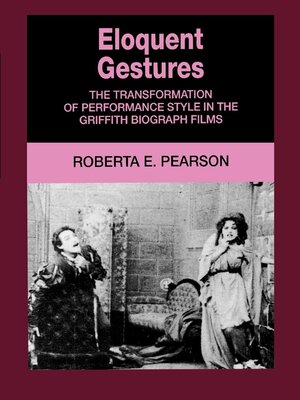Eloquent Gestures
ebook ∣ The Transformation of Performance Style in the Griffith Biograph Films
By Roberta Pearson

Sign up to save your library
With an OverDrive account, you can save your favorite libraries for at-a-glance information about availability. Find out more about OverDrive accounts.
Find this title in Libby, the library reading app by OverDrive.



Search for a digital library with this title
Title found at these libraries:
| Library Name | Distance |
|---|---|
| Loading... |
Between 1908 and 1913, D. W. Griffith played a key role in the reformulating of film's narrative techniques, thus contributing to the creation of what we now think of as the classical Hollywood cinema. This book is the only extensive treatment of a critical period in the history of film acting: the emergence of the realistic "verisimilar" style in Griffith's biograph films. Roberta Pearson shows how Griffith gradually abandoned the deliberately affected "histrionic" acting style derived from the nineteenth-century stage. No longer did actors mime distress by raising their arms to heaven or clutching their heads—a subtle facial expression, a slight change in posture would convey a character's extreme emotions instead.
Pearson makes detailed comparisons of certain Biograph films and brings a freshness to her analysis by closely examining contemporary journalistic writing, acting manuals, and the recollections of actors of the time. Her work is important for anyone interested in early cinema and performance, and it will enliven the study of American cultural history and mass communications.
Between 1908 and 1913, D. W. Griffith played a key role in the reformulating of film's narrative techniques, thus contributing to the creation of what we now think of as the classical Hollywood cinema. This book is the only extensive treatment of a critic
Pearson makes detailed comparisons of certain Biograph films and brings a freshness to her analysis by closely examining contemporary journalistic writing, acting manuals, and the recollections of actors of the time. Her work is important for anyone interested in early cinema and performance, and it will enliven the study of American cultural history and mass communications.
Between 1908 and 1913, D. W. Griffith played a key role in the reformulating of film's narrative techniques, thus contributing to the creation of what we now think of as the classical Hollywood cinema. This book is the only extensive treatment of a critic







